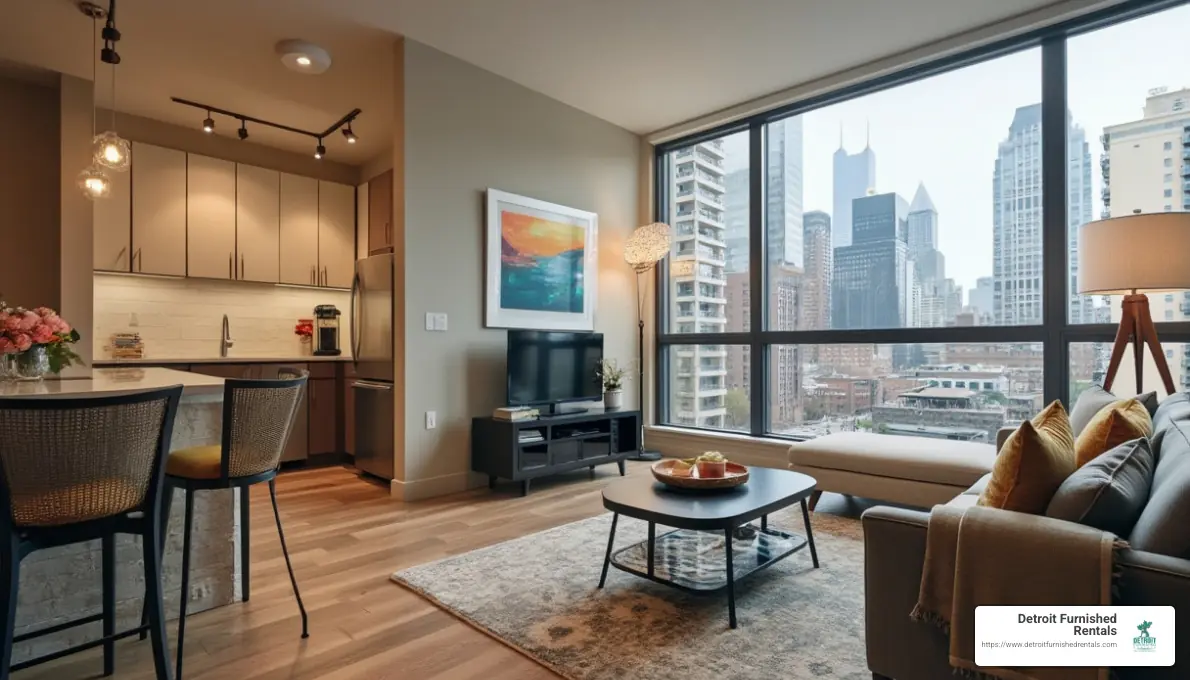Why Student Housing Companies Matter for Your Academic Success
Student housing companies are specialized providers that develop, own, and manage residential accommodations specifically designed for college and university students. These companies range from local operators managing a few properties to major national brands overseeing thousands of beds across multiple markets.
Quick Answer: Top Student Housing Company Types
- National Operators: Large-scale providers with high resident satisfaction rates
- Regional Specialists: Mid-size operators managing thousands of beds across specific regions
- International Networks: Global providers operating across multiple countries
- Development Companies: Specialists in building and developing student communities
The student housing industry has exploded as universities struggle to meet growing enrollment demands. Traditional dorms often can’t accommodate everyone, creating a massive supply gap that private companies are filling with purpose-built communities.
These companies offer everything from basic shared rooms to luxury studio apartments, typically located within walking distance of campus. They provide fully furnished units, high-speed internet, study spaces, fitness centers, and social programming designed to support both academic success and community building.
I’m Sean Swain, and through my work with Detroit Furnished Rentals, I’ve seen how quality housing impacts student success, particularly in serving traveling professionals and international students who need flexible, well-equipped accommodations. My experience managing short-term furnished rentals has given me deep insights into what student housing companies must provide to create environments where residents can truly thrive academically and socially.
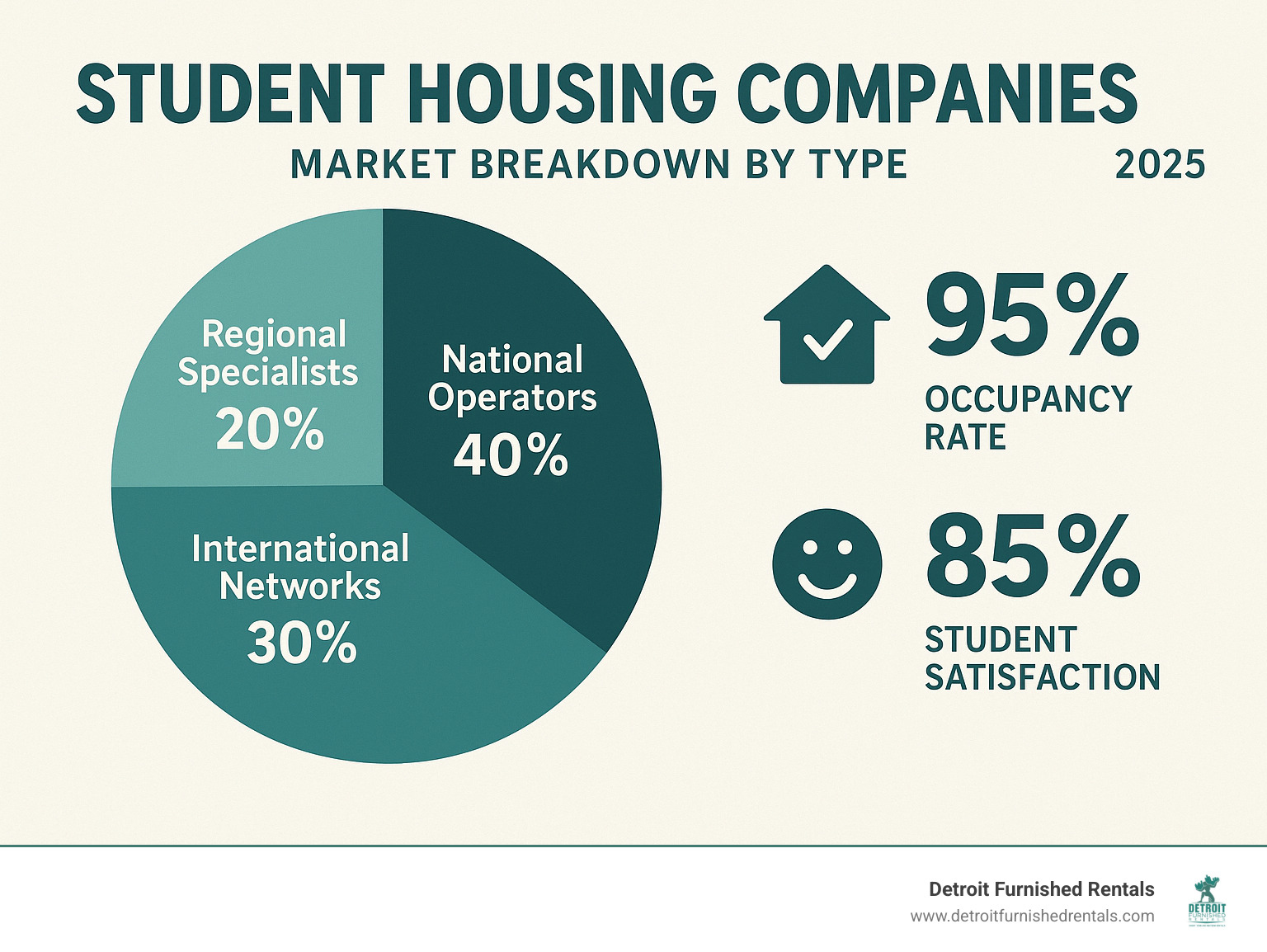
Student housing companies helpful reading:
The Landscape of Student Housing Companies
The student housing companies industry has grown into a multi-billion dollar sector that’s reshaping how students live and learn across the globe.
Universities are bursting at the seams with more students than ever before, but they can’t build housing fast enough. That’s where these companies step in, creating everything from cozy shared apartments to luxury high-rises that look more like upscale hotels than traditional dorms.
The variety is striking. You’ve got local specialists who know every coffee shop within walking distance of campus and understand exactly when students need to move in for spring semester. Then there are regional operators who’ve figured out how to deliver consistent quality across multiple college towns. At the top, national brands operate like well-oiled machines, standardizing everything from lease agreements to community programming.
Public-private partnerships have become the secret sauce for many universities. Instead of taking on massive debt to build new housing, schools team up with private companies who handle the financing, construction, and management.
Sustainability commitments have moved from nice-to-have to must-have. Today’s students expect solar panels, energy-efficient systems, and green building practices. Smart companies have realized that going green isn’t just good for the planet – it’s good for their bottom line too.
| Role | Ownership | Management | Development |
|---|---|---|---|
| Local Specialists | Often own 1-5 properties | Hands-on, personal approach | Small-scale, market-specific |
| Regional Operators | Mixed ownership/management | Standardized processes | Multi-market development |
| National Brands | Varied models | Corporate systems | Large-scale projects |
| P3 Developers | Partnership structures | University collaboration | Campus-integrated facilities |
Key Segments of Student Housing Companies
Local and regional student housing companies are the unsung heroes of college towns. These operators typically manage anywhere from 500 to 5,000 beds, and they know their markets intimately. They understand when students start looking for housing, what amenities matter most, and how to price units competitively.
Campus-affiliated organizations operate in a unique space. They work closely with universities, sometimes managing on-campus housing or developing facilities on university land. These companies balance profitability with supporting the school’s academic mission.
Public-private partnership developers have become major players, especially for big projects. These companies work directly with universities to finance, build, and operate student housing.
Business Models within Student Housing Companies
Fee-based management is the bread and butter for many student housing companies. These companies handle everything from maintenance to resident programming in exchange for management fees, usually 3-6% of gross revenue.
Equity ownership is where companies actually own the real estate. It requires more money upfront, but the long-term returns can be substantial.
Hybrid structures give companies the best of both worlds – they earn management fees while also having a stake in the property’s success.
Asset-light platforms focus on technology and services rather than owning buildings. These companies provide the software, booking systems, and expertise that help smaller operators compete with the big players.
Comparing Housing Types & Lease Models
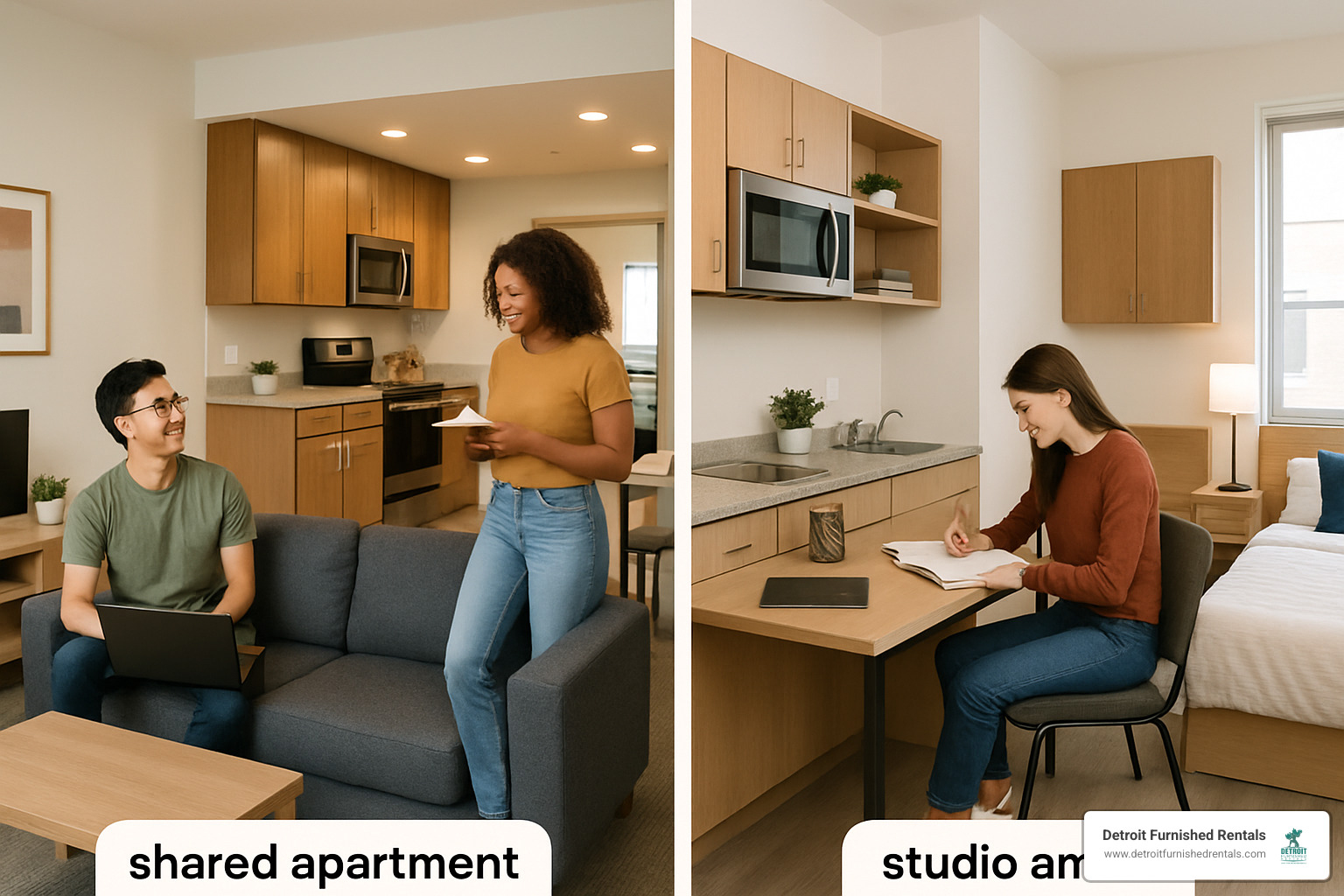
Choosing the right housing option can make or break your college experience. Student housing companies offer a wide array of choices, each designed for different lifestyles, budgets, and academic needs.
On-campus halls are the classic college experience most people picture. You’ll get a shared room, communal bathrooms, and usually a meal plan. While they’re often the cheapest option upfront, you’ll have limited privacy and strict rules about everything from guests to cooking your own food.
Off-campus communities have become the gold standard for many students. These purpose-built complexes offer apartment-style living with your own bedroom but shared common areas. You get the independence of living off-campus with amenities that rival luxury hotels. More info about Off-Campus options
Co-living suites split the difference nicely. You’ll have your own private bedroom but share a kitchen and living room with a few other students. This model creates spaces where students can build networks while still having personal space to decompress.
Micro-studios are perfect if you value privacy above all else. These compact units include everything you need – private bathroom, kitchenette, and sleeping area – all in one efficient space.
Most student housing companies provide furnished accommodations because they understand student life. You don’t want to haul furniture across the country or figure out where to store it over summer break.
The lease length you choose can significantly impact both your flexibility and your wallet. Twelve-month leases are still the standard because they provide stability. Six-month options work well if you’re doing internships or study abroad programs. Semester leases align perfectly with academic calendars but usually cost more per month. Flexible stays are becoming more popular, especially for international students.
Utilities-included pricing has become the norm among leading providers. No more arguments with roommates about who used too much electricity or forgot to pay the internet bill.
The choice between rent-by-bed and rent-by-unit models depends on your social situation. Rent-by-bed means you can secure housing without finding roommates first. Rent-by-unit works better if you already have friends you want to live with.
Amenities & Resident Experience
Today’s student housing companies compete fiercely on amenities, and students are the winners here.
Study rooms have evolved into sophisticated learning environments. You’ll find collaborative spaces for group projects, quiet zones for intense focus, and technology-enabled rooms with smartboards and video conferencing.
High-speed Wi-Fi isn’t just an amenity anymore – it’s essential infrastructure. Reliable connectivity is crucial for online classes, research, and staying connected with family and friends.
Fitness centers range from basic equipment rooms to full-service facilities that rival commercial gyms. Many providers now offer group fitness classes, personal training, and wellness programming.
Rooftop terraces and outdoor spaces provide crucial mental health benefits. These areas often feature barbecue facilities, fire pits, and comfortable seating where you can decompress after a tough exam.
Mental health support has become increasingly important as universities recognize the stress students face. Leading providers partner with mental health initiatives to promote wellness awareness.
Community events help combat the isolation that many students experience. Regular programming creates opportunities for friendships that often last well beyond graduation.
Partnership Structures with Universities
Ground leases represent one of the most common partnership models, where universities lease land to student housing companies for development. This arrangement lets universities maintain long-term control while benefiting from private sector expertise.
Revenue sharing agreements create win-win partnerships where both the university and the housing company benefit from successful operations.
Academic-linked programming integrates housing with educational missions, creating living-learning environments that support academic success.
Resident assistant models leverage student leadership to build community while providing peer support.
Trends & Innovations in Student Housing
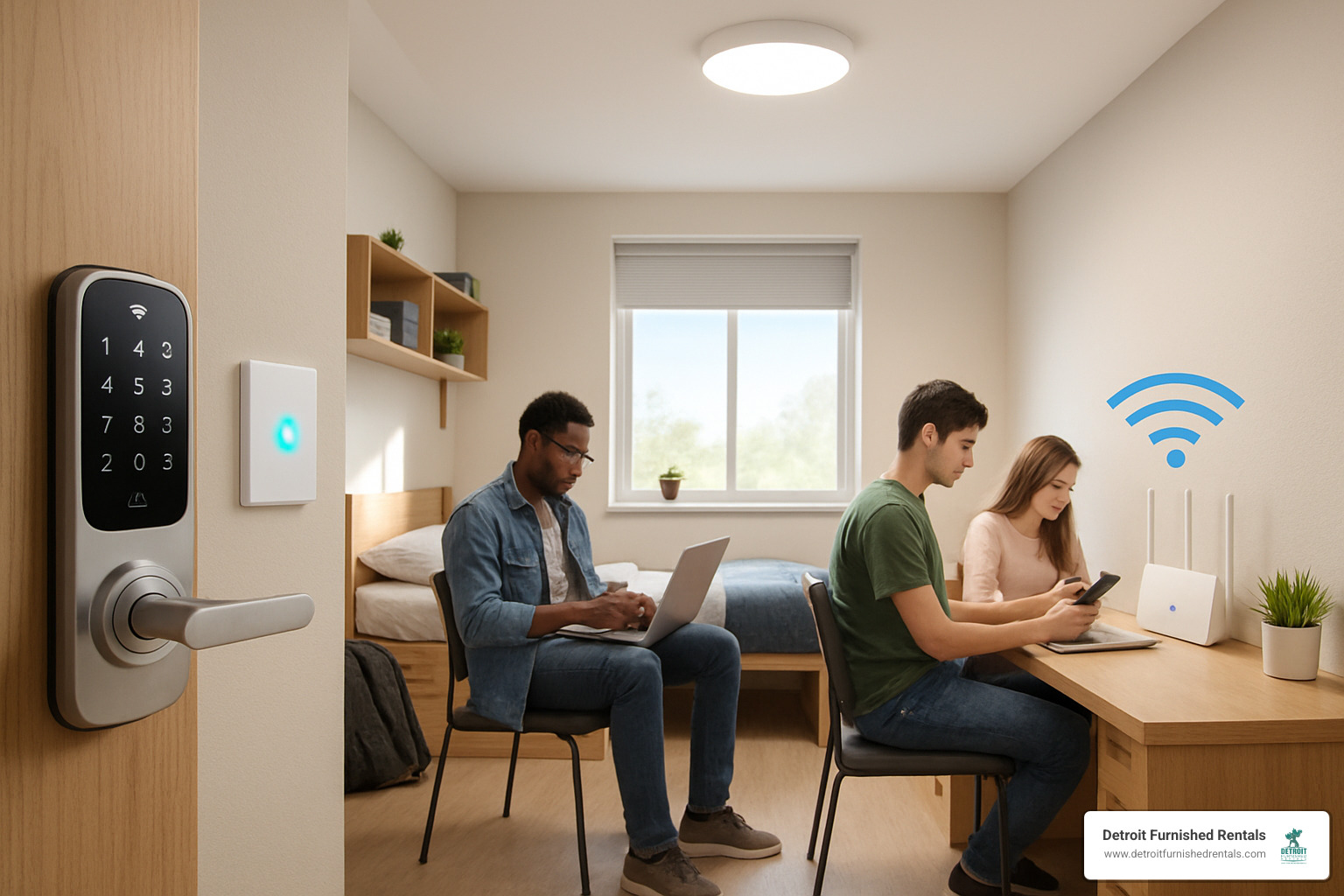
The world of student housing companies is changing fast, and it’s exciting to see how innovation is making student life better. Companies are racing to meet new expectations from students who want more than just a place to sleep – they want smart, sustainable, and supportive communities.
Green building practices are leading the charge in this change. Leading providers install solar panels, provide e-cars for residents, and implement comprehensive recycling programs throughout their facilities. These aren’t just feel-good initiatives – they actually save money on utility bills while attracting environmentally conscious students.
The technology revolution in student housing is remarkable. Smart-access control systems have replaced traditional keys at many properties, letting students use their phones or key fobs to enter buildings and rooms. This isn’t just convenient – it’s much safer too.
App-based maintenance has transformed how students get help with their living spaces. Instead of calling an office during business hours, residents can now report broken appliances, request repairs, and track progress through dedicated mobile apps.
The focus on mental health initiatives reflects a growing understanding that where students live affects how they feel. Leading student housing companies now provide dedicated wellness rooms, partner with counseling services, and host programming specifically designed to support mental health awareness.
Diversity and inclusion programs ensure that all students feel welcome, regardless of their background. Companies are implementing cultural programming, offering language support services, and designing spaces that celebrate different traditions and lifestyles.
To address affordability concerns, many providers are developing affordable micro-units that maximize every square foot. These compact spaces prove that you don’t need a huge apartment to have everything you need for successful student living.
Modular construction is revolutionizing how quickly new student housing gets built. This approach allows companies to construct buildings faster and more cost-effectively while maintaining high quality standards. Latest research on industry rankings shows that innovation is happening across all segments of the industry.
Sustainability & Technology Leaders
The push toward energy efficiency has become a major competitive advantage for forward-thinking student housing companies. Smart thermostats automatically adjust temperatures based on occupancy, LED lighting systems reduce electricity consumption, and high-efficiency HVAC systems keep students comfortable while minimizing environmental impact.
Many major operators are setting carbon neutral goals that drive real innovation in how buildings are designed and operated.
Digital leasing platforms have made finding and securing student housing much easier. Students can now complete entire rental processes online, from initial property searches to signing lease agreements.
Virtual tours became essential during the pandemic, but they’ve remained popular because they’re so convenient. High-quality virtual experiences help students make informed housing decisions even when they can’t visit properties in person.
Community-Building & Academic Impact
Modern student housing companies understand that great housing supports academic success. Learning lounges have evolved far beyond basic study rooms, offering collaborative spaces where students can work together on projects and support each other’s learning.
Some providers go even further by offering tutoring programs that directly support academic achievement. These on-site academic support services help students succeed without having to travel across campus for help.
Resident satisfaction surveys help companies continuously improve their offerings. The feedback loop between students and management ensures that housing keeps getting better over time.
The connection between quality housing and GPA correlations is becoming clearer through research. When students feel confident about their living situation, they’re more likely to feel confident about their academic success too.
Safety, Well-Being & Inclusion
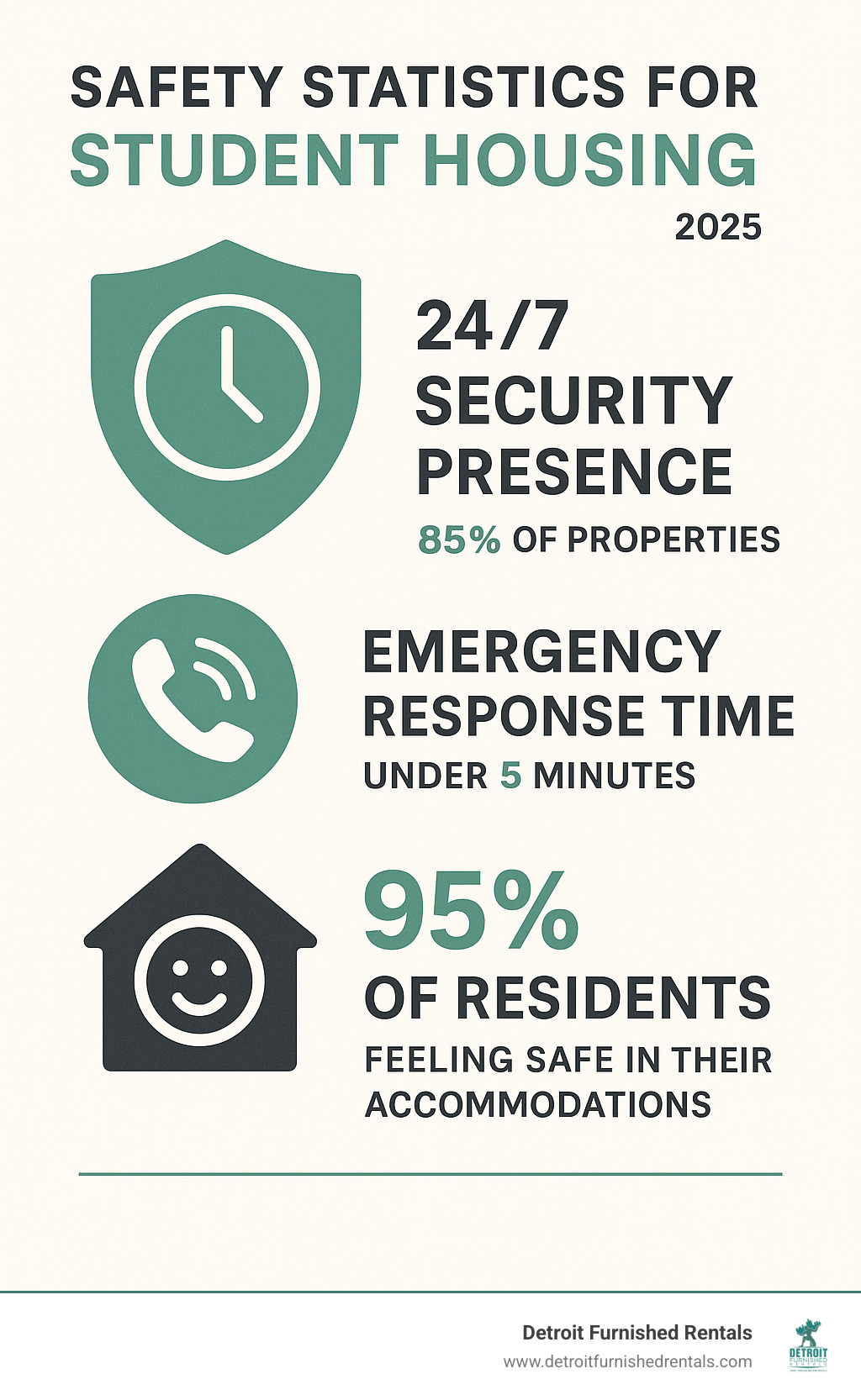
When you’re living away from home for the first time, feeling safe and supported isn’t just important – it’s essential for your academic success. The best student housing companies understand this completely, which is why they’ve built comprehensive safety systems that go far beyond basic security measures.
Picture this: you’re walking back to your residence at 11 PM after a long study session at the library. Quality student housing companies ensure you’ll find 24/7 security waiting to help if needed. Top-tier providers back this up, offering round-the-clock duty managers and reception services so someone’s always there when you need assistance.
Key-fob access systems have replaced traditional keys at most modern facilities. These aren’t just convenient – they create detailed records of who enters buildings and when. If something goes wrong, security teams can quickly review access logs to understand what happened.
CCTV systems monitor common areas, entrances, and parking lots continuously. The best part? Modern systems connect to mobile apps, so security staff can respond to incidents within minutes rather than hours.
But safety goes deeper than cameras and security guards. Emergency response plans cover everything from medical emergencies to severe weather. Leading providers conduct regular drills and maintain direct communication with local emergency services.
Wellness rooms provide quiet spaces for meditation, prayer, or simply decompressing after a stressful day. These facilities recognize that your well-being includes mental and emotional health, not just physical safety.
Inclusivity training ensures staff can support students from all backgrounds. This covers cultural sensitivity, LGBTQ+ support, and accommodations for students with disabilities.
For international students, the challenges multiply. International student support addresses unique needs like visa requirements, cultural adjustment, and language barriers. Seasoned international operators have refined these services across multiple countries, developing expertise in serving students from vastly different cultural backgrounds.
How Student Housing Companies Safeguard Residents
The most responsible student housing companies pursue safety certifications that exceed minimum legal requirements. These certifications demonstrate genuine commitment to resident protection rather than just checking boxes.
Mental health hotlines provide 24/7 access to counseling and crisis support. This recognizes that student safety encompasses emotional well-being alongside physical security. It’s reassuring to know help is just a phone call away, especially during finals week or when homesickness hits hard.
Pandemic protocols developed during COVID-19 have become permanent features at many properties. Improved cleaning procedures, better air filtration systems, and flexible policies help protect resident health during any health emergency.
These measures aren’t just about compliance – they’re about creating environments where students can focus on their studies without worrying about their safety or well-being.
Supporting Diverse & Global Student Populations
Orientation programs help new residents integrate into their communities successfully. These programs are particularly valuable for international students who may be unfamiliar with local customs, academic expectations, or even basic things like how to set up a bank account.
Language support services assist non-native speakers with lease documentation, maintenance requests, and community integration. Some student housing companies provide multilingual staff and translated materials, making the transition much smoother for students still developing their English skills.
Adaptive leases accommodate students with varying academic schedules and visa requirements. International students often need flexible lease terms that align with their program duration and visa status – something traditional landlords rarely understand.
Accessible design ensures facilities serve students with disabilities effectively. This includes physical accessibility features like ramps and wider doorways, as well as policies that accommodate various learning and mobility needs.
The goal is creating communities where every student feels welcome, supported, and able to succeed academically. More info about International Housing provides additional insights into serving global student populations.
Through my experience with Detroit Furnished Rentals, I’ve seen how proper safety measures and inclusive policies create environments where students can truly thrive. When residents feel secure and supported, they’re free to focus on what matters most – their education and personal growth.
Frequently Asked Questions about Student Housing Companies
What lease length is best for graduate research stays?
Graduate students face unique challenges when it comes to housing. Unlike undergraduates who follow predictable academic calendars, graduate researchers often deal with uncertain timelines, varying funding cycles, and research schedules that don’t align with traditional lease terms.
Most student housing companies default to 12-month leases, but this rigid approach doesn’t work for everyone. Graduate students conducting research may need to extend their stay unexpectedly when experiments run long, or they might finish early and want to move on to the next phase of their career.
The best lease options for graduate research stays include month-to-month arrangements after an initial commitment period. This gives you stability while maintaining flexibility for those inevitable timeline changes. Academic year leases spanning 9-10 months work well if your research follows the university calendar closely.
Semester-based renewals offer another smart option, letting you reassess your situation every few months without getting locked into long-term commitments. Look for providers that offer extension clauses – these allow you to extend your lease with reasonable advance notice when your research timeline shifts.
How do pricing models differ between rent-by-bed and rent-by-unit?
Understanding pricing models can save you significant money and headaches. Student housing companies typically use one of two approaches, each with distinct advantages and potential drawbacks.
Rent-by-bed models treat you as an individual tenant responsible only for your bedroom and shared access to common areas. You sign your own lease and pay your own rent, regardless of what your roommates do. This approach offers individual liability – if your roommate decides to move out suddenly, your rent stays the same.
These arrangements often include roommate matching services where the housing company helps pair compatible residents. Your costs remain predictable throughout your lease term, and most rent-by-bed arrangements bundle utilities and amenities into one monthly payment.
Rent-by-unit models work more like traditional apartment rentals. You and your roommates share responsibility for the entire unit’s rent. While this typically results in lower per-person costs when fully occupied, it also means you’re on the hook if roommates leave unexpectedly.
The rent-by-unit approach gives you greater control over who you live with and how you use the space. You’ll have more flexibility with guest policies and room arrangements. If you’re moving in with established friends, this model often provides the best value.
Which amenities most influence academic success?
Not all amenities are created equal when it comes to supporting your academic goals. Research from leading student housing companies reveals that certain features directly correlate with student confidence and academic performance.
Study-focused amenities top the list for obvious reasons. Quiet study rooms with comfortable seating and proper lighting create spaces where you can actually concentrate. High-speed internet isn’t just convenient – it’s essential for research, online learning, and staying connected with professors and classmates.
24/7 access to study spaces becomes crucial during exam periods when you need to work at odd hours. Having printing and copying facilities on-site saves time and reduces stress when assignments are due.
Health and wellness features play a surprisingly important role in academic success. Fitness centers help manage stress and improve focus – physical activity literally helps your brain work better. Outdoor spaces provide necessary mental health breaks from intensive study sessions.
Access to healthy food options or full kitchens supports proper nutrition, which directly impacts your ability to concentrate and retain information. Wellness programming including mental health support helps you steer the inevitable stresses of academic life.
Community building elements create the social support networks that help students succeed. Social spaces encourage peer interaction and study groups, which often lead to better understanding of course material. Resident programming builds supportive communities where students help each other succeed.
Conclusion
The world of student housing companies has transformed dramatically over the past decade, creating opportunities that previous generations of students could only dream of. What started as basic dormitories has evolved into sophisticated communities designed to support every aspect of student life.
Today’s student housing companies understand something fundamental: where you live directly impacts how well you learn. The data backs this up – leading companies report that 85% of their residents feel confident about their academic success, while satisfaction rates consistently exceed 90% among top providers.
The key is knowing what to look for. The best student housing companies share certain characteristics that set them apart. They prioritize safety with 24/7 security systems and emergency response protocols. They offer flexible lease terms that actually work with academic schedules rather than against them. Most importantly, they create inclusive communities where students from all backgrounds can thrive.
Technology and sustainability have become game-changers in this industry. Smart access controls, app-based maintenance, and energy-efficient systems aren’t just nice features anymore – they’re expectations. The companies leading the pack are those investing in green building practices and digital solutions that make student life easier.
Community matters more than ever. Students today face unprecedented challenges, from academic pressure to social isolation. The most successful student housing companies recognize this, offering everything from mental health support to cultural programming that helps students build meaningful connections.
Here in Detroit, we’ve witnessed how quality housing transforms the student experience. Through Detroit Furnished Rentals, we’ve provided comfortable, flexible accommodations for students who need more than just a place to sleep. Our pet-friendly apartments with dedicated workspaces and fully equipped kitchens create environments where students can focus on what matters most – their education.
Your housing choice is an investment in your future. Whether you’re an undergraduate looking for your first taste of independence or a graduate student needing flexibility for research, the right student housing company can make all the difference. Look for providers that understand your unique needs and offer the support systems that help you succeed.
The industry continues to evolve, but one thing remains constant: students who feel safe, supported, and connected in their housing are more likely to achieve their academic goals. That’s not just good business for student housing companies – it’s the foundation of student success.
For students in the Detroit area seeking furnished accommodations that truly support academic achievement, explore our short-term rental options designed with the modern student lifestyle in mind.



